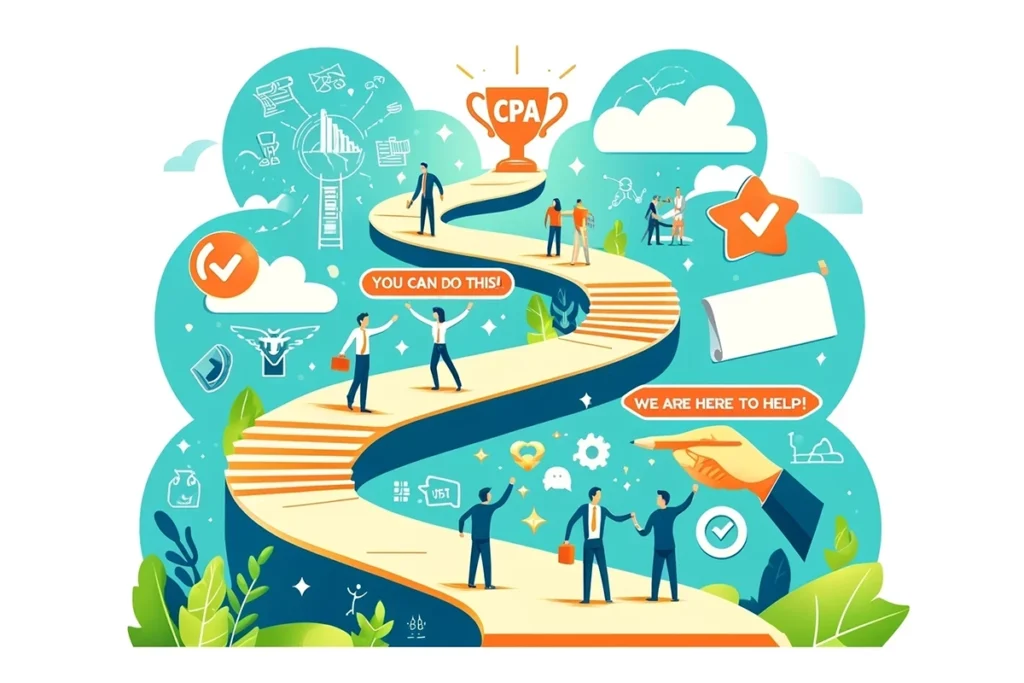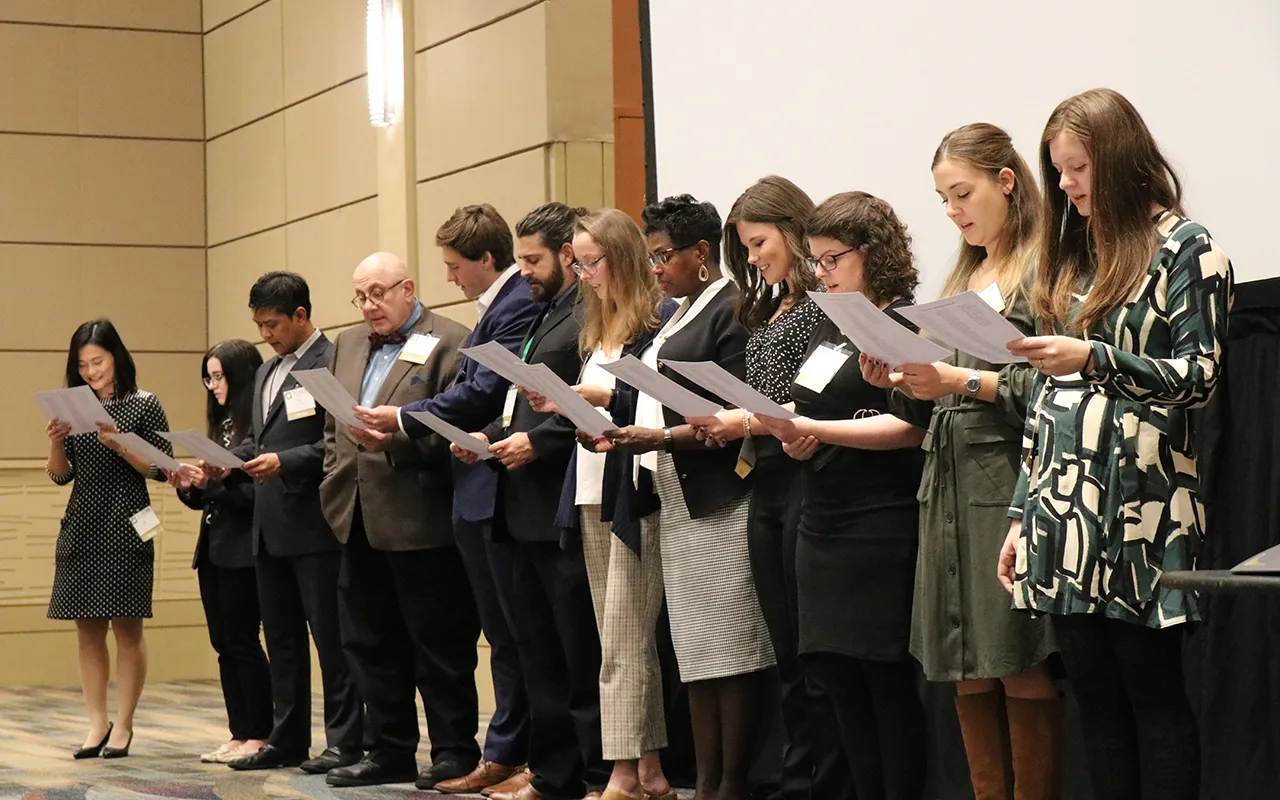From Study to Success: The CPA Journey
How do I become a CPA?
The CPA licensure process has several steps, but don’t worry! We are here to help make sure your journey to becoming a CPA is as smooth and successful as possible. From understanding the educational requirements to passing the CPA exam and gaining the necessary work experience, we provide comprehensive support and resources at each stage. You can do this, and you have a powerful team behind you every step of the way, offering guidance, encouragement, and expertise to help you achieve your professional goals. Together, we’ll navigate the complexities and celebrate your milestones, ensuring you are well-prepared and confident in your path to licensure.

Dreaming of becoming a CPA? It all starts with your degree. In South Carolina, you’ll need a bachelor’s or higher in accounting (or a related field) from an accredited college or university.
The best part? You’ve got options. South Carolina offers three flexible education-and-experience pathways to licensure—so you can choose the route that fits your goals and timeline.
Your career, your path.
Licensure Pathways in South Carolina
To qualify for CPA licensure, you must complete one of the following:
- A master’s degree (or higher) in accounting or a related field plus one year of qualifying experience
- A bachelor’s degree in accounting or a related field plus two years of qualifying experience
- A bachelor’s degree plus 30 hours of credit plus one year of qualifying experience
SCACPA Is Here to Support You
Paying for school? SCACPA can help with your tuition costs. Each year, the SCACPA Educational Fund awards scholarships to future CPAs like you. Scholarship awards typically range from $500 to $2,500, depending on available funds and applicant qualifications. >> Find out more.
Ready to Sit for the CPA Exam?
If you’ve completed at least 120 semester credits, including:
- 24 credits in accounting, and
- 24 credits in business courses
…you may apply to sit for the Uniform CPA Exam in South Carolina.
The South Carolina Board of Accountancy requires all CPAs to fulfill prerequisites for practical work experience before approving a candidate for licensure. The good news is that South Carolina’s work experience requirements are more approachable than most states and allow qualifying part-time and volunteer work. You need one year (2,000 hours) of public accounting experience supervised and verified by an active South Carolina CPA or five years of teaching accounting.
Before continuing with the licensure process, take and pass “Professional Ethics: The AICPA’s Comprehensive Course,” a home-study course on professional ethics. You must earn a score of 90 or above and attach a copy of your certificate of completion to your licensing application.
Congratulations! You’ve put in the work, passed the exam, and now it’s time for the big moment: applying for your CPA license with the South Carolina Board of Accountancy. Once your application is approved, you’ll be invited to an official New CPA Oath Ceremony, where you’ll celebrate your accomplishment alongside your peers.
Confirm you have satisfied the following eligibility requirements for licensure:
- Completed a master’s degree (or higher) in accounting or a related field plus one year of qualifying experience OR completed a bachelor’s degree in accounting or a related field plus two years of qualifying experience
- Passed all portions of the Uniform CPA Exam with a score of 75% or higher.
- Have your college mail your official transcript to the South Carolina Board of Accountancy at P.O. Box 11329; Columbia, SC 29211-1369.
- Submitted your certificate of completion from the professional ethics course to the Board.
- Complied with the Board’s experiential requirement of one year of public accountancy experience (2,000 hours) or five years of experience teaching accounting. Complete the Certification of Experience form, have your supervising CPA sign it, and mail it to the Board.
- Apply for your license via the Licensing Application After Exam form and mail your application and supporting documentation directly to the Board (address above).
Well done! You are now a CPA in South Carolina! We can’t wait to celebrate with you! The SC Board of Accountancy and SCACPA sponsor two New CPA Oath Ceremonies every year where you receive your certificate and take pride in your accomplishment alongside your peers. Get ready for all the recognition and opportunities to come because of your incredible accomplishment and those three letters you can now put behind your name.
CPA Exam
Earning your CPA license doesn’t just give you letters after your name—it unlocks your career potential.
- Boost Your Career: CPAs are often first in line for promotions and leadership roles.
- Earn More: On average, CPAs make 15% more than accounting graduates without the license.
- Stand Out: The CPA is the gold standard in the accounting profession—employers actively seek it.
- Meet Demand: Businesses everywhere need accounting, tax, and assurance services—and CPAs are in high demand.
- Expand Your Skills: Thanks to technology, CPAs now deliver new, valuable, and exciting services beyond traditional accounting.
To join their ranks, Candidates must pass three core sections and one discipline on the CPA Exam.
Taking the Exam
- 120 Credit Hours to sit for the exam
- 24 semester credit hours of accounting courses
- 24 semester credit hours of business courses
Earning the License
- A master’s degree (or higher) in accounting or a related field plus one year of qualifying experience OR A bachelor’s degree in accounting or a related field plus two years of qualifying experience
- Pass the Uniform CPA Examination
- Good moral character
Core Sections
The Audit & Attestation section of the exam covers planning engagement, internal controls, obtaining document information, reviewing and evaluating information, and communications.
- Section Time: 4 Hours
- Multiple Choice Questions: 78
- Task-based Simulations: 7
The Financial Accounting & Reporting section of the exam covers Financial statements, types of transactions, governmental accounting, and not-for-profit accounting.
- Section Time: 4 Hours
- Multiple Choice Questions: 50
- Task-based Simulations: 7
The Regulation section of the exam covers federal taxation, business law, ethics, and professional responsibility.
- Section Time: 4 Hours
- Multiple Choice Questions: 72
- Task-based Simulations: 8
Disciplines
The BAR discipline focuses on assurance, financial statement analysis and reporting, and technical accounting. The content of the discipline includes a focus on data analysis and assesses topics such as financial risk management and planning techniques.
- Section Time: 4 Hours
- Multiple Choice Questions: 50
- Task-based Simulations: 7
This discipline focuses on technology and business controls. It is designed for candidates interested in assurance or advisory services related to business processes, information systems, information security, and IT audits.
- Section Time: 4 Hours
- Multiple Choice Questions: 82
- Task-based Simulations: 6
The TCP discipline includes taxation topics involving more advanced individual and entity tax compliance. Candidates interested in personal financial planning, entity planning, inclusions in gross income, and taxation compliance should take this discipline.
- Section Time: 4 Hours
- Multiple Choice Questions: 68
- Task-based Simulations: 7

